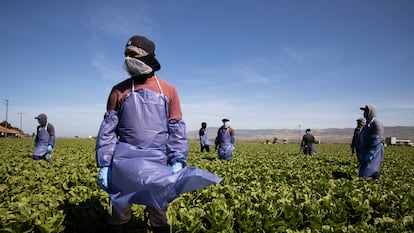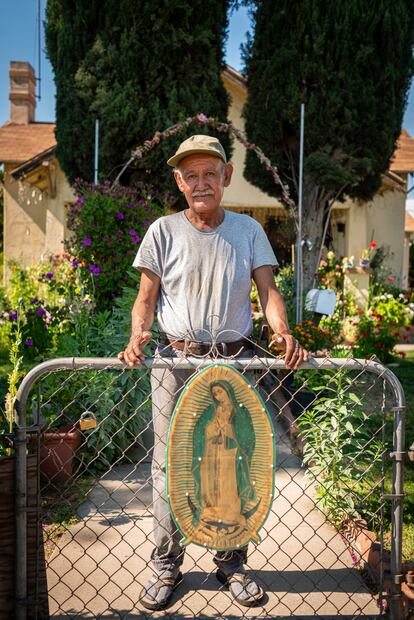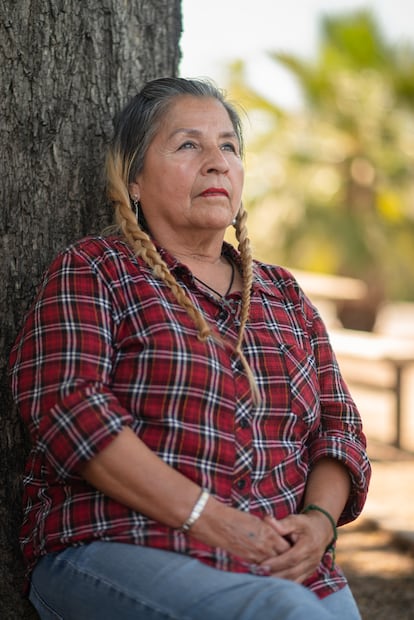Summer 2024 is a death threat for US agricultural workers
The country lacks a federal law protecting farm laborers, who are largely undocumented immigrants, from record temperatures caused by climate change


Asunción Ponce is familiar with the toll that high temperatures taken on the body. He has spent 60 of his 67 years out in the fields. He started as a boy in his hometown of Puebla, Mexico. Since 1988, he has worked in the ranches of the San Joaquín valley in central California, where he has harvested grapes, plums, nectarines and peaches. Last year, he was hospitalized for heatstroke. He began to feel exhausted, dizzy. He drank water, but it was too late. “My stomach was very hot and if you drink a cold beverage, it goes down badly. I started to vomit. I imagine it’s like embers when you throw water on them, how they hiss! That’s what your stomach is like,” says Ponce, in the garden of his Fresno home.

Ponce has the right to take a 10-minute break at 8am. He gets 30 unpaid minutes to eat lunch and another 10-minute rest at 1pm. These rest periods were a victory won by his union. Like many of these workers’ benefits, they were achieved through tragedy. The 2008 death of María Isabel Vásquez Jiménez, a 17-year-old farmworker who collapsed after a nine-hour shift with neither shade nor water, put California on a fast track to finding solutions. Protections for day laborers have been locally mandated since the 1980s, but are rarely enforced. In 2005, five workers died from heat-related causes and another five died in the three months prior to the tragic death of Vásquez. Arnold Schwarzenegger, who was the state’s Republican governor at the time, attended the young woman’s funeral and promised to pass stricter laws to protect agricultural workers. These were enacted on May 14, 2015, exactly seven years after her death.
The United States is preparing for a hotter summer than usual. Its national meteorological agency says that a combination of the El Niño and La Niña phenomenons will mean higher temperatures in all but one state, North Dakota. Throughout the rest, and across various regions, climate change is expected to increase that threat. Among the places that will affected are Texas, which has been experiencing 47 additional days a year with thermometers reaching above 100 degrees Fahrenheit, compared to 50 years ago. Such forecasts are a death threat for tens of thousands of agricultural workers across the country, a silent workforce that is largely comprised of undocumented immigrants who work full shifts beneath an increasingly intense sun.
Ponce’s short and wiry stature — his belt nearly encircles his waist two times — belies the fact that the man’s daily task is to fill 44 Lb sacks of fruit from 5:30am to 2pm for $16 an hour. “When you feel poorly, you have to tell the overseer immediately because if you try to tough it out, you could fall off the ladder and turn out worse. Now, they pay more attention when you get sick. Before, they wouldn’t provide you with any care,” says Ponce, who obtained U.S. citizenship three years ago.
United Farm Workers (UFW), the union founded by emblematic Latino leader César Chávez, has fought for years for a federal law that would provide minimum protections to open-air workers. California was the first of only five states (Colorado, Minnesota, Oregon and Washington) that have similar legislation.
Such regulations are more and more important in the face of climate change. Of the 169 agricultural workers who died on the job in California between 2018 and 2022, some 83 died when the temperature had risen above 80 degrees Fahrenheit. When it gets higher than 95 degrees Fahrenheit, workers have the right to rest, in accordance with regulations. Last year, the hottest ever, the state broke 358 high-temperature records during just 28 days in July. Arizona, on the other hand, suffered 31 consecutive days with thermometers rising above 110 degrees Fahrenheit. Some non-profits calculate that farmworkers labor at least 21 days a season during temperatures that pose health risks.
“Our goal for this summer is for President Biden’s administration to take executive action and for the federal agency to adopt federal regulations for the entire country,” says Antonio de Loera, UFW spokesperson. Using this method, the Democratic president could avoid interference by Republicans in Congress. At least 344 workers have died from heat exposure since 2011, according to official numbers from the Department of Labor. In December of 2021, the agency proposed protective regulations for work in relation to heat, but they have not been approved.
The most conservative sectors of the Republican Party have made it clear that they prefer to politicize basic measures that could prevent deaths. The governor of Florida, Ron DeSantis, signed a law in April that prohibits cities and counties from instituting such protections. That leaves two million people, from agricultural workers in the central areas of the state to construction industry employees, exposed. DeSantis’s decision was the product of a political battle with the local government of Miami-Dade county, which is led by Democrats.
“They are discriminating against us because we are the only ones who work in the field,” says Antonia Catalán, a Florida agricultural worker and local workers’ rights advocate. “The politicians aren’t interested in taking care of the people who work here. They prefer to support the farmers and the business owners. People put up with it because they don’t have immigration papers. They are afraid of getting fired if they speak up,” says the activist, who is originally from Ixmiquilpan in the Mexican state of Hidalgo, and became a citizen with amnesty granted by Ronald Reagan in 1986.
On January 1, 2023, a 28-year-old man died in Parkland, Florida during what was his first shift as an agricultural day laborer. The worker had arrived just days prior from Mexico to a bell pepper farm and had a temporary work visa. After five hours of pulling weeds and setting stakes, he began to feel fatigued and couldn’t move his legs. Soon after, his coworkers found him unconscious in a ditch. Like many of his colleagues, he was showing “symptoms of heat exhaustion,” according to a Department of Labor investigation that was published in June of last year. The agency found that his death had been avoidable and fined his boss $15,600 for having exposed workers to the heat. Temperatures that day had risen to 90 degrees Fahrenheit.
High temperatures don’t just cause heatstroke. They are also linked to heart attacks and other cardiovascular problems. In recent years, scientists have also connected them to chronic kidney disease, a silent and less notorious epidemic. It can affect individuals who perform physical labor in high temperatures without rest and proper hydration. The condition is not caused by traditional risk factors such as diabetes, obesity and hypertension. Kidneys begin to fail, which can lead to death if not properly treated.
This illness particularly affects agricultural workers. A study carried out by a team in California found that such health condition was present in 12% of a group of nearly 300 day laborers. Another, similar study carried on Florida, a state that has no strict protections, found many more cases. Of 192 agricultural workers who were studied across 555 days in 2015 and 2016, 33% showed signs of kidney damage. In addition, the study found that 53% of workers began their shift dehydrated, a percentage that rose to 81% by the end of the shift.

“If now, when we have many protections, labor abuse keeps happening, what was it like before?,” asks Lourdes Cárdenas, another UFW worker from Fresno. “The abuses will keep happening until we raise our voice,” says the 61-year-old woman, who is originally from Sinaloa but has lived in the United States since 2003. She and Ponce are witnesses to how times have changed. “Now people are aware that the heat kills. Some farmers still get smart with us, but less so nowadays,” says Ponce. California is waiting for the rest of the United States to learn the lesson.
Sign up for our weekly newsletter to get more English-language news coverage from EL PAÍS USA Edition
Tu suscripción se está usando en otro dispositivo
¿Quieres añadir otro usuario a tu suscripción?
Si continúas leyendo en este dispositivo, no se podrá leer en el otro.
FlechaTu suscripción se está usando en otro dispositivo y solo puedes acceder a EL PAÍS desde un dispositivo a la vez.
Si quieres compartir tu cuenta, cambia tu suscripción a la modalidad Premium, así podrás añadir otro usuario. Cada uno accederá con su propia cuenta de email, lo que os permitirá personalizar vuestra experiencia en EL PAÍS.
¿Tienes una suscripción de empresa? Accede aquí para contratar más cuentas.
En el caso de no saber quién está usando tu cuenta, te recomendamos cambiar tu contraseña aquí.
Si decides continuar compartiendo tu cuenta, este mensaje se mostrará en tu dispositivo y en el de la otra persona que está usando tu cuenta de forma indefinida, afectando a tu experiencia de lectura. Puedes consultar aquí los términos y condiciones de la suscripción digital.








































